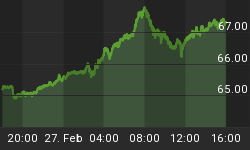Two things happened in the 1960s. Most importantly, that decade ended. Second, consumers and investors began learning to not be fooled by governmental policies and actions. That learning experienced was reinforced by the many policy errors of the 1970s.
At the start of those two decades, consumers and investors did not understand the future effects of excessive government spending. Monetization of debt and price increases was not part of their experience. Only after inflation ravaged their investments down into bottom in 1974 did they fully comprehend how damaging governments might be. The important lesson consumers and investors learned was to anticipate what government policies would do to them. Importantly, they learned to alter their investment postures and consumption spending to defend themselves from governments. And finally, they learned that the purpose of government is to deprive them of wealth and liberty, not to provide those to them.
Markets look forward, discounting events in advance,. That they have done with a vengeance. From middle of summer through confirmation by November election, U.S. investors began to anticipate Obama's policies. They began to immediately discount the soon to be most investor unfriendly U.S. administration in history. Knowing that jobs and wealth would be destroyed by adverse tax policies, consumers retrenched further. Yes, Obama, by vocalizing in advance his wealth damaging intentions, owns these financial markets and unfolding U.S. depression.

Our first graph reports on the status of the Obama financial markets. Picture is not pretty. Investors, anticipating wealth destroying tax policies from the new administration, did what investors do in such a situation. They sold, and continue to sell as adverse tax policies pour forth. Gold, perhaps the only haven, has responded favorably. The difference in performance of these two markets is about 50 percentage points, and that since only the first Tuesday in November.
Perhaps the only market yet to respond is the foreign exchange market. With the U.S. plunging into the Obama Depression, the dollar will ultimately reflect the fundamental flaws in U.S. economic policies. At the moment, the U.S. is a cash vacuum. It is sucking in cash from around the world in order to "stay afloat." Drivel about the European Union collapsing is the normal sign of a market well past its fundamentals. Some are promoting or seeking out rumors to feed the now malnourished move of the U.S. dollar. Not since the pound crashed have fundamentals so pointed to a currency, the U.S. dollar, going down.
Anthony DiNozzo wisely advises that movies can be a great source of wisdom. "Viva Villa"(1934), starring Wallace Beery as Poncho Villa, might be a good candidate for viewing at the White House and Federal Reserve. At one point, the General has taken power in Chihuahua(1913-4). Typical of government leaders, he orders money to be printed to pay for things. The printers deliver the money, demanding payment for their work. Villa suggests that they take some of the newly printed paper money as payment. They respond that the paper money is worthless. They wanted real money. Is it possible that printers in Chihuahua 100 years ago were wiser than today's Federal Reserve and the U.S. Council of Economic Advisors?

Our second graph would have warmed Villa's heart. The Federal Reserve was apparently not happy with the extent to which they had been able to monetize U.S. debt. In February, the Federal Reserve launched massive purchases of mortgage debt. Those purchases are reflected in the annualized 13-week growth rate of the Fed's holdings of debt. That rate of debt monetization has recently approached a 100% annual rate.
As we reported in a previous discussion, the Federal Reserve had been happy to let foreign central banks finance the U.S. economy. It is for that reason that the growth rate for debt monetization had been negative in the early part of the graph. No longer are they content with that. The Federal Reserve, now a central bank fully captive to politics, is monetizing with abandonment. Villa would have loved these guys!
Holders of U.S. dollar denominated assets must make some serious decisions. They must abandon political ideology, or face the loss of their wealth. U.S. will soon be the most investor unfriendly developed country in the world. Wealth within the U.S. is to be taxed unmercifully under the "trickle up" policies of the new administration. One media network has wisely coined the name, Obama's War on Wealth. Investors shoul not allow their wealth to remain in dollars or in the soon to become most taxpayer unfriendly U.S.
U.S. government deficit will be something on order of $2.5-3.0 trillion over the next year. That money will be raised from gullible foreign central banks, or more likely by debt monetization by Federal Reserve. Quite frankly folks, Gold will be the primary beneficiary in such a world. With China's economy gaining on U.S. and with a far friendly business climate developing there, investors already owning Gold might consider investments that will gain from Chinese prosperity.

Gold has rallied incredibly since the October low, shortly before the Obama election victory. It recently reached an intensely over bought condition from which it is now correcting. With daily doses of fantasy over possibility of U.S. government actually creating an effective economic solution to the Obama Depression, investors have stepped back. We have high hopes that $Gold will develop an over sold condition in the coming week and that we can issue another intermediate buy signal to investors. Yes, change has indeed arrived. Your financial wealth has been changed to a considerably lesser amount. Gold's value has been changed into a higher amount.
GOLD THOUGHTS come from Ned W. Schmidt,CFA,CEBS as part of a joyous mission to save investors from the financial abyss of paper assets. He is publisher of The Value View Gold Report, monthly, and Trading Thoughts, weekly. To receive these reports, go to http://home.att.net/~nwschmidt/Order_Gold_EMonthlyTT.html.















